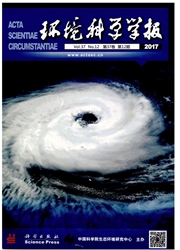

 中文摘要:
中文摘要:
成分复杂的垃圾渗滤液经处理后,研究其中残留的极低浓度的酚类环境内分泌干扰物的雌激素效应及其对生态环境的毒性作用具有非常重要的实际价值.本文选择对雌激素敏感的MCF-7人类乳腺癌细胞进行体外培养,将老龄渗滤液原液、经过内部微电解(IME)和内部微电解结合芬顿试剂(IME-Fenton)处理后的渗滤液酚类提取液稀释10-107倍,采用MTT法测定MCF-7细胞的增殖和细胞划痕损伤实验评价渗滤液中酚类物质的雌激素效应,并探讨了活性炭在反应中对酚类物质的去除效果.结果表明,渗滤液中酚类提取物对MCF-7细胞增殖在浸染72 h后达到最大;与渗滤液原液相比,渗滤液经IME和IME-Fenton处理后,最大增殖效应分别下降了85%和110%,酚类提取物减缓了MCF-7细胞的迁移速度;活性炭对渗滤液中酚的吸附主要发生在反应前30 min,渗滤液经活性炭吸附后的酚类提取物稀释10-10^7倍仍表现出细胞毒性.渗滤液经IME-Fenton处理后降低了酚类物质进入环境引起的危害,MCF-7细胞增殖和细胞划痕也为检测浓度低至10^-15g·L^-1的酚类雌激素提供新方法.
 英文摘要:
英文摘要:
It is of great practical value to study the estrogen effect at the extremely low concentration phenols after the treatment of landfill leachate and the toxic effect of the ecological environment. Human breast adenocarcinoma( MCF-7) cells sensitive to estrogen were chosen in vitro culture. MTT method and cell scratch damage on MCF-7 cells were used to study phenols extracts from landfill leachate diluted 10 - 107 times,and the removal effects of phenols by activated carbon were discussed. The results showed that the proliferation of MCF-7 cells reached the maximum after 72 h impregnation with phenols extracts. Compared with the raw leachate,the largest proliferation of phenols extracts decreased 85% and 110% after the treatments of IME and IMEFenton,respectively. Phenols extracts from landfill leachate could slow down the rate of migration of MCF-7 cells. Adsorption of activated carbon on phenols in the landfill leachate occurred mainly in the first 30 min reaction,and the phenols extracts diluted 10 to 10^7 times after adsorption of activated carbon still showed cell toxicity. The landfill leachate treated by IME-Fenton reduced the harm to the environment caused by the phenolic substances. The proliferation and scratches of MCF-7 cells may also provide a new method for the detection of concentrations of 10^-15g·L^-1phenols.
 同期刊论文项目
同期刊论文项目
 同项目期刊论文
同项目期刊论文
 Humic analog AQDS and AQS as an electron mediator can enhance chromate reduction by Bacillus sp stra
Humic analog AQDS and AQS as an electron mediator can enhance chromate reduction by Bacillus sp stra Compensatory growth of the bloom-forming dinoflagellate Prorocentrum donghaiense induced by nitrogen
Compensatory growth of the bloom-forming dinoflagellate Prorocentrum donghaiense induced by nitrogen Spatial and Seasonal Variations of Total Petroleum Hydrocarbonin Surface Water and Sediment in Pearl
Spatial and Seasonal Variations of Total Petroleum Hydrocarbonin Surface Water and Sediment in Pearl Promotion effects of nitrogen on the cell proliferation of Platymonas subcordiformis evaluated by sp
Promotion effects of nitrogen on the cell proliferation of Platymonas subcordiformis evaluated by sp Ecotoxicity of two organophosphate pesticides chlorpyrifos and dichlorvos on non-targeting cyanobact
Ecotoxicity of two organophosphate pesticides chlorpyrifos and dichlorvos on non-targeting cyanobact Ability of the marine diatoms Pseudo-nitzschia multiseries and P. pungens to inhibit the growth of c
Ability of the marine diatoms Pseudo-nitzschia multiseries and P. pungens to inhibit the growth of c Spatial–temporal distribution and potential ecological risk assessment of nonylphenol and octylpheno
Spatial–temporal distribution and potential ecological risk assessment of nonylphenol and octylpheno Spatial-temporal distribution of phthalate esters from riverine outlets of Pearl River Delta in Chin
Spatial-temporal distribution of phthalate esters from riverine outlets of Pearl River Delta in Chin Determination of enrofloxacin and ciprofloxacin in foods of animal origin by capillary electrophores
Determination of enrofloxacin and ciprofloxacin in foods of animal origin by capillary electrophores Distribution and Risk Assessment of Heavy Metals inSediments of the Pearl River Estuary, Southern Ch
Distribution and Risk Assessment of Heavy Metals inSediments of the Pearl River Estuary, Southern Ch Occurrence of phthalate esters in surface water and sediments from the Pearl River Delta, Southern C
Occurrence of phthalate esters in surface water and sediments from the Pearl River Delta, Southern C Inhibitory effects of Chinese traditional herbs and herb-modified clays on the growth of harmful alg
Inhibitory effects of Chinese traditional herbs and herb-modified clays on the growth of harmful alg Effect of Vitamin-B1 and Vitamin-B12 on the Growth and Carotenoid Content of Haematococcus pluvialis
Effect of Vitamin-B1 and Vitamin-B12 on the Growth and Carotenoid Content of Haematococcus pluvialis 期刊信息
期刊信息
